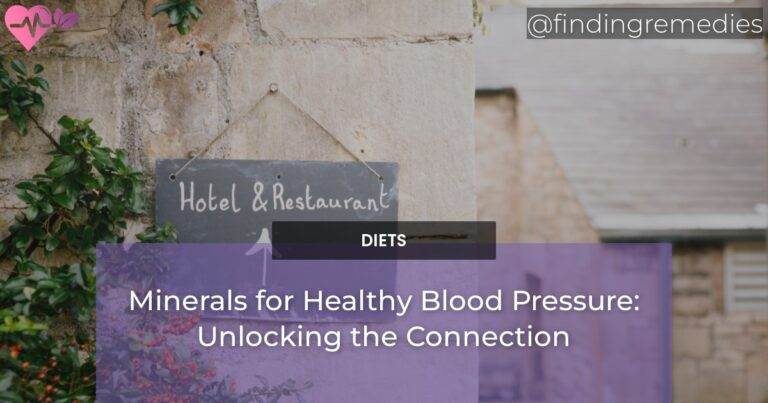As we age, our bodies lose their ability to regulate essential minerals. Unfortunately this affects our health and can lead to high blood pressure, which is one of the common health problems among adults. Although there are conventional medications to lower blood pressure, they can come with various side effects. Fortunately, taking specific minerals can help maintain healthy blood pressure without the risk of side effects.
In this article – “Minerals for Healthy Blood Pressure: Unlocking the Connection” – we will dive into the connection between minerals and blood pressure, and find out which of them are the best for maintaining healthy blood pressure levels. To start off, understanding what high blood pressure is and what are the risks associated with it is key to understanding how minerals could help. We will then examine 5 minerals that can be used to help lower blood pressure.
Blood pressure is a crucial aspect of overall health. Maintaining a healthy blood pressure is essential for cardiovascular health and to prevent various health complications. One effective way to regulate blood pressure is through a mineral-rich diet. Minerals play a significant role in the body, and their impact on blood pressure should not be overlooked.
Table of Contents
The Importance of Maintaining a Healthy Blood Pressure
It is important to maintain a healthy blood pressure because high blood pressure, also known as hypertension, can lead to severe consequences. Hypertension increases the risk of heart disease, stroke, kidney problems, and other health issues. By keeping blood pressure within a healthy range, individuals can significantly reduce the chances of developing these conditions.
Mineral-Rich Diet and Blood Pressure
The connection between a mineral-rich diet and blood pressure lies in the impact minerals have on the body. Potassium, calcium, magnesium, and zinc are minerals that have been associated with maintaining blood pressure within a healthy range. Including these minerals in your diet can contribute to better blood pressure control.
How do Minerals Affect Blood Pressure?
Minerals play a vital role in regulating blood pressure. Potassium helps in maintaining normal blood pressure levels by counteracting the effects of sodium. Calcium plays a crucial role in the constriction and relaxation of blood vessels. Magnesium helps relax blood vessels, allowing for smoother blood flow. Zinc supports the production of nitric oxide, which helps in blood vessel dilation. By consuming minerals, individuals can promote healthy blood pressure.
Mineral-Rich Foods to Include in Your Diet
Incorporating mineral-rich foods into your diet is essential for maintaining a healthy blood pressure. Some examples of mineral-rich foods include:
– Spinach: High in potassium and magnesium
– Yogurt: Good source of calcium
– Almonds: Rich in potassium and magnesium
– Oysters: Excellent source of zinc
– Beans: Packed with potassium and magnesium
It is recommended to consume a balanced diet that includes these mineral-rich foods to ensure an adequate intake of essential minerals for blood pressure control.
The Importance of a Balanced Diet
A balanced diet is crucial in maintaining a healthy blood pressure. A diet that incorporates a variety of whole foods, especially fruits, vegetables, and whole grains, provides the necessary micronutrients, including minerals, for optimal health. A plant-based diet, such as the DASH (Dietary Approaches to Stop Hypertension) diet, can be particularly beneficial in regulating blood pressure.
Minerals for Healthy Blood Pressure
High blood pressure affects millions of people globally and can lead to serious health issues if not properly managed. Making dietary and lifestyle changes is key to controlling hypertension. Certain minerals play an important role as well. Here we will look at 5 minerals that have been shown to help lower blood pressure:
- Calcium – This mineral is involved in muscle contraction and vascular function. Getting enough calcium ensures optimal blood pressure. Dairy products, leafy greens, and supplements are good sources.
- Magnesium – Magnesium relaxes blood vessels and balances calcium channels. Increased intake has been shown to lower blood pressure. Foods with magnesium include nuts, seeds, leafy greens, beans, and whole grains.
- Potassium – Potassium blunts the effects of sodium and helps vasodilation. Diets high in potassium-rich foods like fruits, vegetables, beans, and dairy are beneficial. Monitoring potassium levels is important, especially with medication use.
- Chromium – Chromium enhances insulin function and improves lipid profiles. While food sources are limited, chromium supplements have demonstrated efficacy for reducing blood pressure.
- Coenzyme Q10 – CoQ10 acts as an antioxidant and aids energy production. Supplements have reduced systolic and diastolic blood pressure in clinical studies. Dietary sources include meat, fish, nuts and seeds.
Ensuring optimal intake of these 5 minerals through food sources and possibly supplementation can be a safe, effective component of an overall blood pressure management plan. Consulting with a healthcare provider is always advised when making major dietary changes.
The Bottom Line
In conclusion, a mineral-rich diet plays a significant role in maintaining a healthy blood pressure. Including minerals like potassium, calcium, magnesium, and zinc can have a positive impact on blood pressure regulation. By consuming nutrient-rich foods and following a balanced diet, individuals can promote heart health and reduce the risk of hypertension and other cardiovascular complications.
Frequently Asked Questions (FAQs)
How does a mineral-rich diet affect blood pressure?
A mineral-rich diet helps regulate blood pressure by providing essential minerals like potassium, calcium, magnesium, and zinc, which have been associated with maintaining healthy blood pressure levels.
What are the minerals that can help in maintaining a healthy blood pressure?
Minerals such as potassium, calcium, magnesium, and zinc are known to contribute to the maintenance of a healthy blood pressure.
How much of each mineral should be consumed daily?
The recommended daily intake of minerals varies depending on factors such as age, sex, and overall health. Consulting with a healthcare professional or registered dietitian can provide personalized recommendations for mineral intake.
Why is it important to have a balanced diet?
A balanced diet provides the necessary nutrients, including minerals, for optimal health. It helps maintain a healthy blood pressure and reduces the risk of various health conditions.

